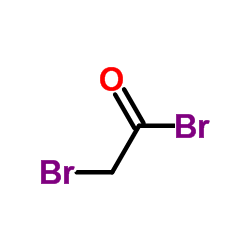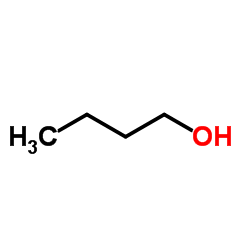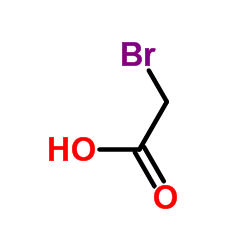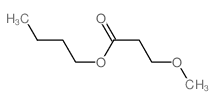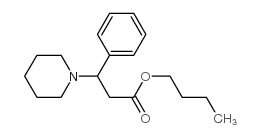18991-98-5
| 中文名 | 溴乙酸丁酯 |
|---|---|
| 英文名 | butyl 2-bromoacetate |
| 中文别名 | 4-溴丁酯 |
| 英文别名 |
Butyl bromoacetate
n-butyl monobromoacetate Acetic acid,bromo-,butyl ester EINECS 242-729-9 n-butyl bromoacetate |
| 密度 | 1.352g/cm3 |
|---|---|
| 沸点 | 192.7ºC at 760 mmHg |
| 分子式 | C6H11BrO2 |
| 分子量 | 195.05400 |
| 闪点 | 78.4ºC |
| 精确质量 | 193.99400 |
| PSA | 26.30000 |
| LogP | 1.72460 |
| 蒸汽压 | 0.483mmHg at 25°C |
| 折射率 | 1.457 |
Synonym:None Section 2 - COMPOSITION, INFORMATION ON INGREDIENTS
Risk Phrases: None Listed. Section 3 - HAZARDS IDENTIFICATION EMERGENCY OVERVIEW
The toxicological properties of this material have not been fully investigated. Potential Health Effects Eye: May cause eye irritation. Skin: May cause skin irritation. Ingestion: Ingestion of large amounts may cause gastrointestinal irritation. The toxicological properties of this substance have not been fully investigated. Inhalation: May cause respiratory tract irritation. The toxicological properties of this substance have not been fully investigated. Chronic: No information found. Section 4 - FIRST AID MEASURES Eyes: Immediately flush eyes with plenty of water for at least 15 minutes, occasionally lifting the upper and lower eyelids. Get medical aid. Skin: Get medical aid. Flush skin with plenty of water for at least 15 minutes while removing contaminated clothing and shoes. Ingestion: Do not induce vomiting. If victim is conscious and alert, give 2-4 cupfuls of milk or water. Never give anything by mouth to an unconscious person. Get medical aid. Inhalation: Remove from exposure and move to fresh air immediately. If not breathing, give artificial respiration. If breathing is difficult, give oxygen. Get medical aid. Notes to Physician: Section 5 - FIRE FIGHTING MEASURES General Information: As in any fire, wear a self-contained breathing apparatus in pressure-demand, MSHA/NIOSH (approved or equivalent), and full protective gear. Extinguishing Media: Use carbon dioxide or dry chemical. Section 6 - ACCIDENTAL RELEASE MEASURES General Information: Use proper personal protective equipment as indicated in Section 8. Spills/Leaks: Absorb spill with inert material (e.g. vermiculite, sand or earth), then place in suitable container. Clean up spills immediately, observing precautions in the Protective Equipment section. Section 7 - HANDLING and STORAGE Handling: Wash thoroughly after handling. Wash hands before eating. Use with adequate ventilation. Avoid contact with skin and eyes. Avoid ingestion and inhalation. Storage: Store in a cool, dry place. Store in a tightly closed container. Section 8 - EXPOSURE CONTROLS, PERSONAL PROTECTION Engineering Controls: Use adequate general or local explosion-proof ventilation to keep airborne levels to acceptable levels. Exposure Limits CAS# 18991-98-5: Personal Protective Equipment Eyes: Wear appropriate protective eyeglasses or chemical safety goggles as described by OSHA's eye and face protection regulations in 29 CFR 1910.133 or European Standard EN166. Skin: Wear appropriate protective gloves to prevent skin exposure. Clothing: Wear appropriate protective clothing to prevent skin exposure. Respirators: Follow the OSHA respirator regulations found in 29 CFR 1910.134 or European Standard EN 149. Use a NIOSH/MSHA or European Standard EN 149 approved respirator if exposure limits are exceeded or if irritation or other symptoms are experienced. Section 9 - PHYSICAL AND CHEMICAL PROPERTIES Physical State: Liquid Color: clear slightly yellow Odor: Not available. pH: Not available. Vapor Pressure: Not available. Viscosity: Not available. Boiling Point: 92 - 93 deg C @ 12.00mm Hg Freezing/Melting Point: Not available. Autoignition Temperature: Not available. Flash Point: 109 deg C ( 228.20 deg F) Explosion Limits, lower: Not available. Explosion Limits, upper: Not available. Decomposition Temperature: Solubility in water: Specific Gravity/Density: 1.3480g/cm3 Molecular Formula: C6H11BrO2 Molecular Weight: 195.06 Section 10 - STABILITY AND REACTIVITY Chemical Stability: Stable under normal temperatures and pressures. Conditions to Avoid: Incompatible materials. Incompatibilities with Other Materials: Strong oxidizing agents. Hazardous Decomposition Products: Carbon monoxide, carbon dioxide, hydrogen bromide. Hazardous Polymerization: Has not been reported. Section 11 - TOXICOLOGICAL INFORMATION RTECS#: CAS# 18991-98-5 unlisted. LD50/LC50: Not available. Carcinogenicity: 4-Bromobutyl acetate, 98% - Not listed by ACGIH, IARC, or NTP. Section 12 - ECOLOGICAL INFORMATION Section 13 - DISPOSAL CONSIDERATIONS Dispose of in a manner consistent with federal, state, and local regulations. Section 14 - TRANSPORT INFORMATION IATA Not regulated as a hazardous material. IMO Not regulated as a hazardous material. RID/ADR Not regulated as a hazardous material. Section 15 - REGULATORY INFORMATION European/International Regulations European Labeling in Accordance with EC Directives Hazard Symbols: Not available. Risk Phrases: Safety Phrases: S 24/25 Avoid contact with skin and eyes. WGK (Water Danger/Protection) CAS# 18991-98-5: No information available. Canada None of the chemicals in this product are listed on the DSL/NDSL list. CAS# 18991-98-5 is not listed on Canada's Ingredient Disclosure List. US FEDERAL TSCA CAS# 18991-98-5 is not listed on the TSCA inventory. It is for research and development use only. SECTION 16 - ADDITIONAL INFORMATION N/A |
|
~70% 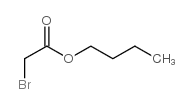
18991-98-5 |
| 文献:Morrissey, Saibh; Pegot, Bruce; Coleman, Deborah; Garcia, M. Teresa; Ferguson, Damien; Quilty, Brid; Gathergood, Nicholas Green Chemistry, 2009 , vol. 11, # 4 p. 475 - 483 |
|
~% 
18991-98-5 |
| 文献:Dhakane, Valmik D.; Chavan, Hemant V.; Thakare, Vishnu N.; Adsul, Laxman K.; Shringare, Sadanand N.; Bandgar, Babasaheb P. Medicinal Chemistry Research, 2014 , vol. 23, # 1 p. 503 - 517 |
|
~% 
18991-98-5 |
| 文献:Piekarski,S. et al. Bulletin de la Societe Chimique de France, 1967 , p. 4055 - 4062 |
| 上游产品 4 | |
|---|---|
| 下游产品 7 | |


